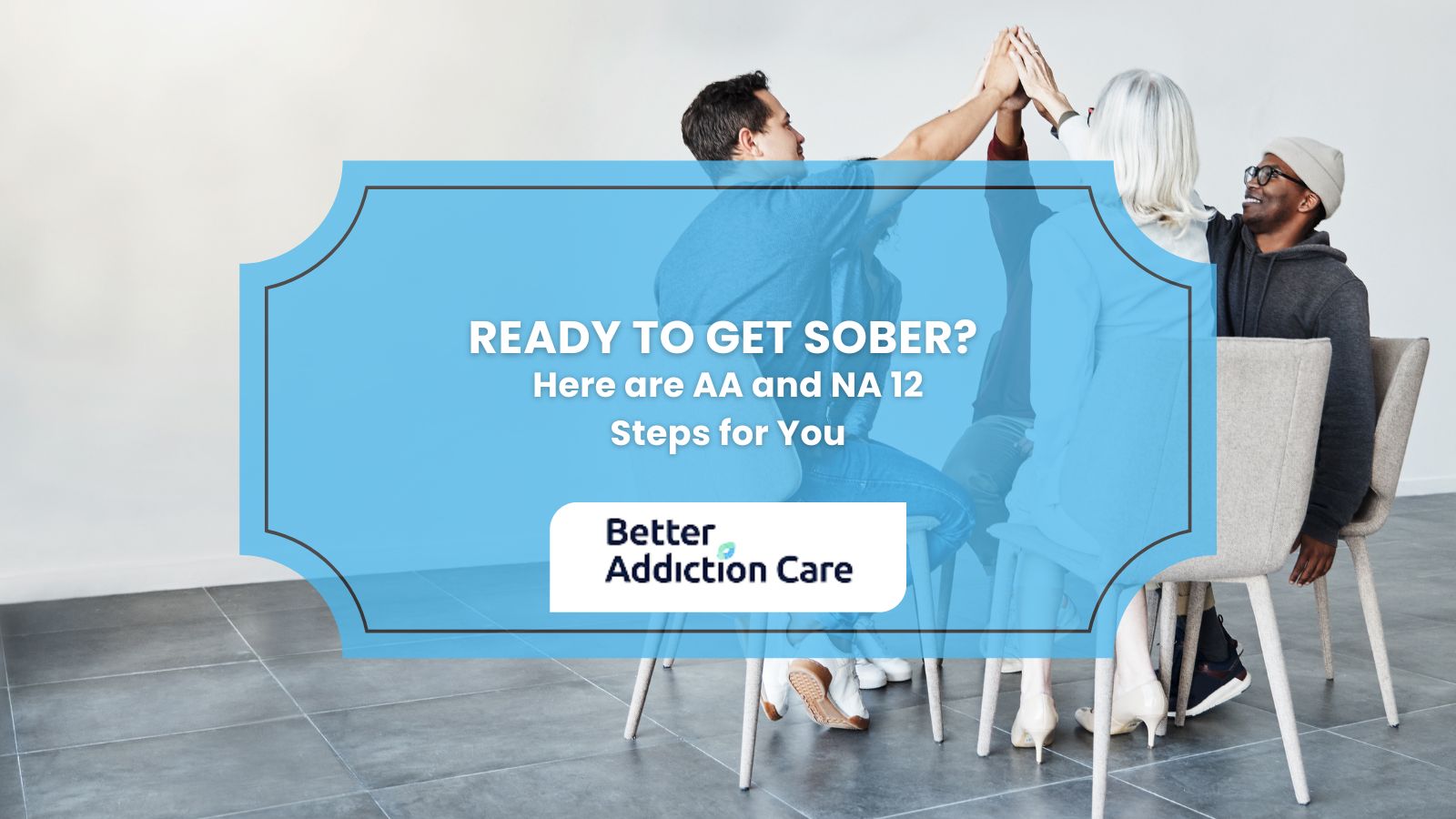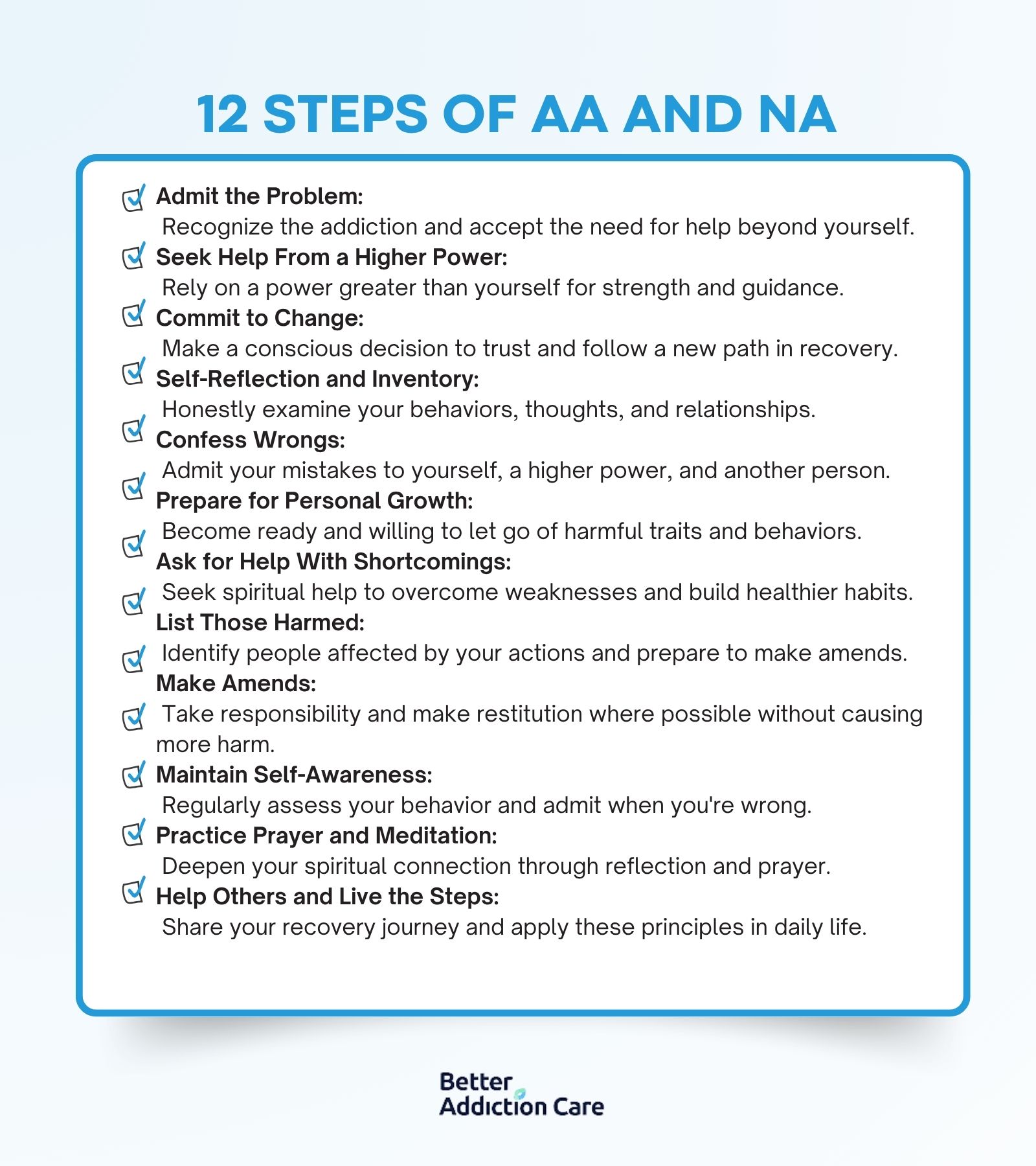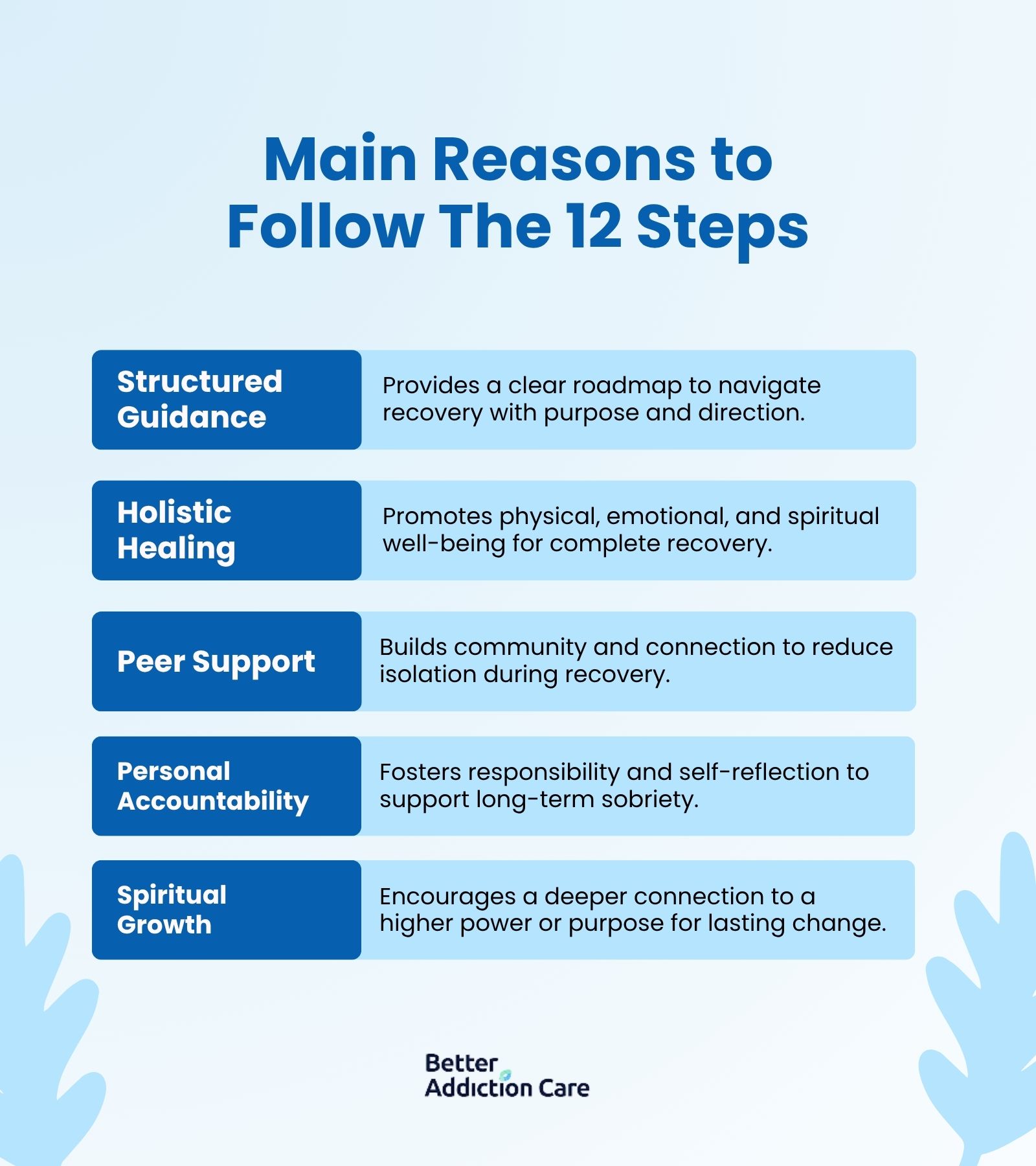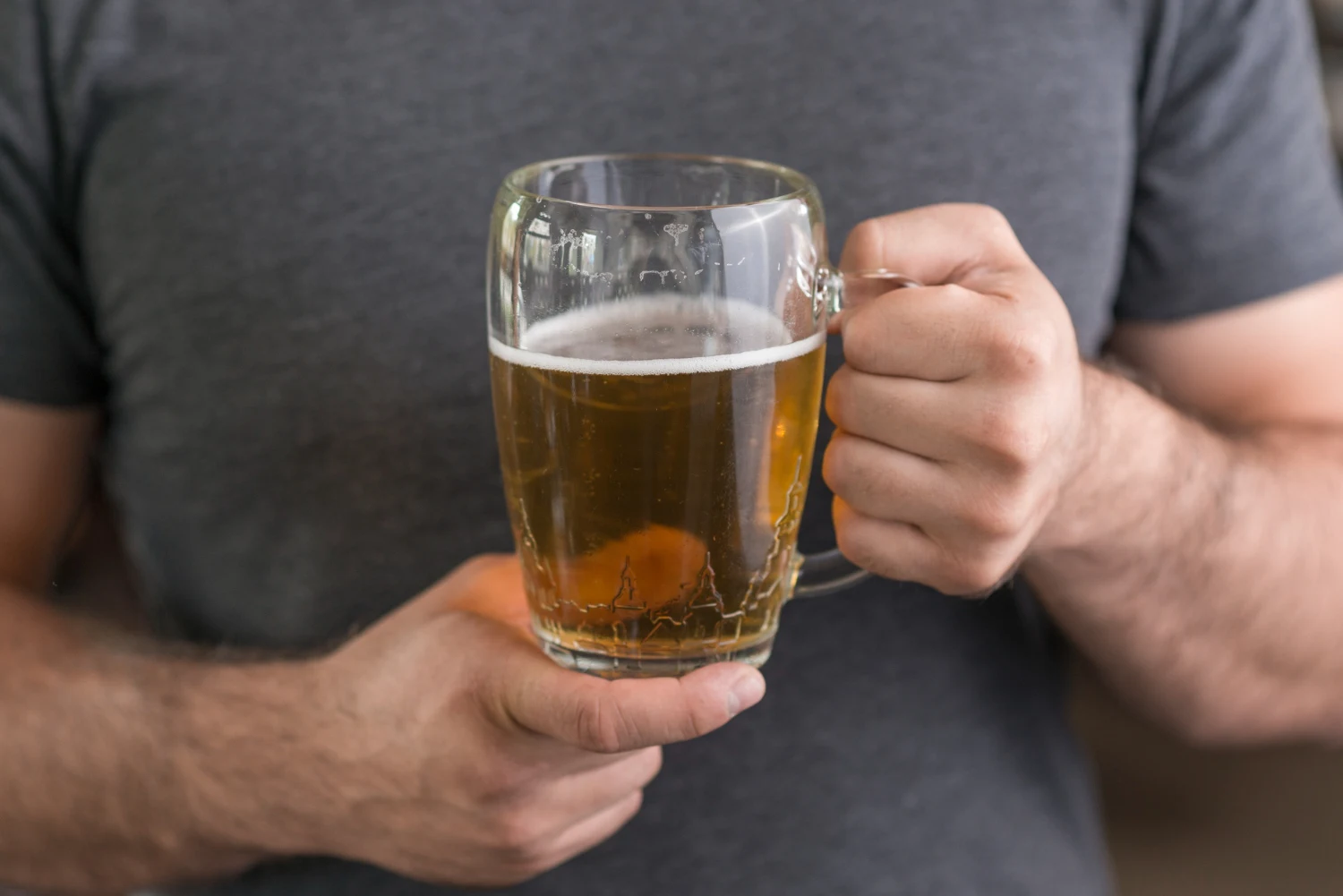Ready to Get Sober? Here are AA and NA 12 Steps for You
The 12 Steps of Alcoholics Anonymous (AA) and Narcotics Anonymous (NA) are structured programs designed to help individuals achieve and maintain sobriety through a combination of supportive fellowship, structured guidance, holistic healing, peer support, personal accountability, and spiritual growth.

Ready to Get Sober? Here are AA and NA 12 Steps for You
The 12 Steps of Alcoholics Anonymous (AA) and Narcotics Anonymous (NA) are structured programs designed to help individuals achieve and maintain sobriety through a combination of supportive fellowship, structured guidance, holistic healing, peer support, personal accountability, and spiritual growth.
According to a comprehensive review of 27 studies published in the Cochrane Database of Systematic Reviews involving more than 10,000 participants, Alcoholics Anonymous and Twelve-Step Facilitation programs demonstrate significant effectiveness in treating alcohol use disorder, with manualized interventions leading to higher rates of continuous abstinence than other established treatments at 12, 24, and 36 months.
If you or a loved one is ready to take control and get sober, understanding the 12-step plan is essential. AA and NA provide a roadmap for recovery, offering local meetings and resources to support individuals on their journey to sobriety.
What Are the 12 Steps of AA and NA?

The 12 Steps involve admitting powerlessness, seeking a higher power, committing to change, self-inventory, confessing wrongs, preparing for growth, asking for help, listing those harmed, making amends, maintaining awareness, practicing prayer/meditation, and helping others.
Here are the common 12 steps of AA and NA in detail:
1. Admit The Problem
Step one to stop an addiction is admitting you need help. Your openness to seeking assistance from higher powers, support groups, or trusted friends and family makes you feel hopeful that you will win this battle when you're not just relying on yourself.
2. Seek Help From A Higher Power
Seeking help from a higher power means accepting that personal strength alone is not enough for recovery. You look for guidance and support from a power greater than yourself, as you understand it.
3. Commit To Change
Committing to change requires making a firm decision to turn your will and life over to the care of a higher power as you understand it. This step involves trust and a conscious effort to pursue a new path.
4. Self-reflection And Inventory
Self-reflection and inventory involve a thorough and honest examination of your thoughts, actions, and relationships. You identify patterns and behaviors that have contributed to your addiction.
5. Confess Wrongs
Confessing wrongs means admitting the exact nature of your mistakes to yourself, a higher power, and another person. This step is about openly acknowledging and taking responsibility for your mistakes and the harm caused by your addiction.
6. Prepare For Personal Growth
Preparing for personal growth requires you to become entirely ready to let go of character defects and embrace positive change. It's about being willing and open to letting go of negative behaviors and attitudes that hold you back from recovery.
7. Ask For Help With Shortcomings
You humbly ask your higher power to remove your shortcomings. This step involves seeking guidance and strength from your higher power to overcome weaknesses and develop healthier habits.
8. List Those Harmed
Make a list of all persons you have harmed and become willing to make amends to them all. This step is about identifying and acknowledging the people you've hurt due to your addiction and being prepared to make things right with them.
9. Make Amends
You make direct amends to such people wherever possible, except when doing so would injure them or others. Here, you take action to apologize and make restitution for the harm caused, unless doing so causes further damage.
10. Maintain Self-awareness
You continue to take personal inventory, and when you are wrong, promptly admit it. This step emphasizes ongoing self-reflection and accountability in your behaviors and relationships, helping you stay on track in recovery.
11. Practice Prayer And Meditation
You seek through prayer and meditation to improve your conscious contact with your higher power, praying only for knowledge of its will for you and the power to carry that out. It's about deepening your spiritual connection and finding guidance and peace through quiet reflection and spiritual practices.
12. Help Others And Live The Steps
After undergoing these steps, you experience a spiritual awakening and strive to pass on this message to others, practicing these principles in all your affairs.
What Do AA and NA Offer for Recovery?
For recovery, AA and NA provide a supportive fellowship of people who understand addiction and recovery. Meetings offer a safe space to share experiences, gain encouragement, and build accountability. Members receive practical tools for managing cravings, handling triggers, and rebuilding relationships. The structure of the 12 Steps guides personal growth and long-term sobriety.
Why Should You Follow These 12 Steps While Recovering From Addiction?

While recovering from addiction, you should follow the 12 steps as they offer structured guidance, ensuring a clear and sequential approach to overcoming addiction while addressing its underlying issues. These steps also promote holistic healing by focusing on physical, emotional, and spiritual well-being and foster a sense of community through peer support. Additionally, they encourage personal accountability and spiritual growth, which are vital for sustained recovery.
Here are the main reasons to follow these 12 steps:
-
Structured Guidance: The steps provide a clear, sequential roadmap for addressing addiction and its underlying issues. Without this structure, individuals feel lost and unsure of how to navigate their recovery journey.
-
Holistic Healing: The steps address the physical, emotional, and spiritual aspects of addiction, promoting overall well-being. Neglecting certain aspects of healing hinders complete recovery.
-
Peer Support: The steps foster a sense of community and shared experience through group settings. Isolation makes recovery more challenging without this support network.
-
Personal Accountability: The steps encourage self-reflection and ownership of one's actions, which is crucial for lasting recovery. Without accountability, individuals struggle to stay committed to their sobriety.
-
Spiritual Growth: Connection with a higher power or a more significant purpose provides grounding and focus. This spiritual dimension is a cornerstone of sustained recovery for many.
How Can I Begin The 12 Steps Through AA and NA Meetings In My Local Area?
Beginning the 12 Steps through AA and NA meetings in your local area starts with locating a nearby meeting. Visit the official AA (Alcoholics Anonymous) or NA (Narcotics Anonymous) websites and use their meeting finder tools, which have listings for meetings worldwide to help you locate one in your area.
Then you just show up!
Meetings are open to anyone who wants to get sober from addiction and usually occur in community centers, churches, or other public spaces. You'll find a welcoming and non-judgmental environment when you attend your first meeting, where everyone understands what you're going through.
In the meeting, you'll hear others share their stories and experiences with the 12 steps. You'll have the opportunity to share your story if you feel comfortable, but there's no pressure - just being there and listening proves incredibly powerful. You'll usually find potential sponsors in the meetings, as a sponsor is someone who has been through the 12 steps and will guide you through the process. Don't hesitate to ask someone whose story resonates with you, as they'll likely be honored to help. With your sponsor's help, you'll start working through the steps individually, with each step building on the last to guide you through the recovery process.
Regular attendance becomes crucial for success. Make meetings part of your weekly routine, as the more you immerse yourself in the community and the steps, the more support you'll have. Incorporate daily practices like prayer, meditation, and self-reflection to stay connected to your recovery journey. Stay in touch with your sponsor and other group members even outside of meetings - many people find it helpful to exchange phone numbers and check in with each other for support and encouragement. As you progress, you'll help others who are just starting, and sharing your story while offering support becomes incredibly rewarding and reinforces your commitment to recovery.
To get started on your journey, find local drug rehab centers in your local area today. Use our local drug rehab locator for more information and to connect with supportive recovery communities near you.





